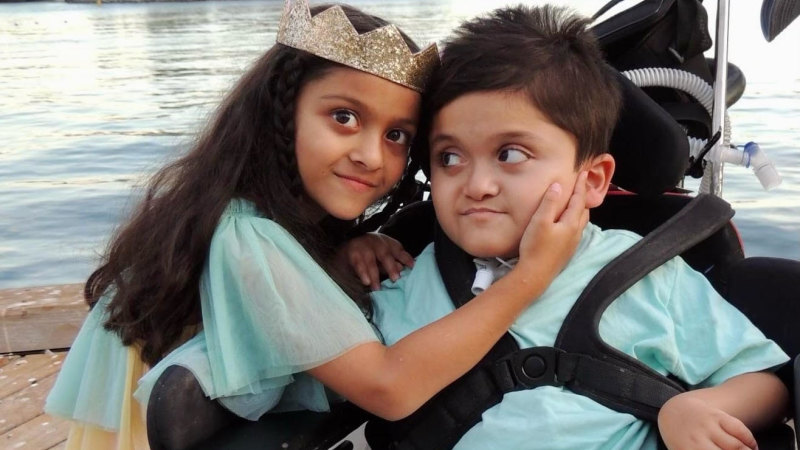Save articles for later
Add articles to your saved list and come back to them any time.
Australia’s practice of deporting migrant families with disabled children over their costly care will be reviewed in return for the Greens’ crucial support for Labor’s delayed Pacific visa lottery, as the government moves to fortify its regional presence while overhauling immigration.
In a significant deal clinched amid international pressure to pass the Pacific Engagement Visa through parliament, Immigration Minister Andrew Giles agreed to review the mechanism the Australian government uses to order temporary visa-holding households with disabled family members to leave the country.
Shaffan (right), 9, has a rare genetic condition that meant his family faced deportation to Pakistan before Immigration Minister Andrew Giles intervened.
Labor has been negotiating crossbench support for its much-hyped, US green card-style ballot system for Pacific migrants, after the Coalition opposed it. The Greens have been pushing for the government to scrap a controversial migration exemption from the Disability Discrimination Act that allows families to be deported.
The mechanism for deportation is the “significant cost threshold”, which calculates the cost of care for the disabled child over 10 years and triggers deportation if it exceeds $51,000, the level considered too burdensome for the Australian community.
Greens disability spokesperson, Senator Jordon Steele-John said Australia’s migration system was ableist, and its “blatant discrimination belongs in the dustbin of history”.
Greens senator Jordon Steele-John described Australia’s migration system as inhumane.Credit: Alex Ellinghausen
“It deliberately provides for discrimination based on disability, which is grossly unfair and inhumane,” he said.
The party’s immigration spokesman Nick McKim said migration settings ought to be brought into line with community standards.
“We are committed to ensuring that Australia’s migration system is fair and inclusive, and today is a significant step towards achieving that goal,” he said.
In a letter to McKim, Giles said he had asked Home Affairs to review the significant cost threshold, to be led by the department’s chief medical officer.
The Butt family faced deportation due to Shaffan’s condition until the minister intervened.
Several families have faced deportation in recent years , with a ministerial waiver often being the only way to stay.
Giles, who has criticised the approach to migration health requirements as not meeting community expectations, told the Greens he had “positively intervened” in all cases that have come before him.
One such family was the Perth-based Butt family. Giles’ intervention ended a years-long battle after their son Shaffan, now nine years old, was born with a genetic condition, chondrodysplasia punctata, which left him paralysed.
Shaffan’s father Qasim, a manager at a solar installation company, said Giles’ intervention earlier this year removed the “sword hanging” over his son’s head. He said while he and his family were trying their best to contribute to Australian life, the law was not on their side.
“I’m so grateful, but as a human being, as a person, I pray to God no one will be in this situation if they have a kid with a disability,” he said, pleading with the government to change the law. “Please, we need to look after the children.”
Immigration Minister Andrew Giles has asked for a review of the key mechanism behind the deportation of families with disabled children.Credit: Alex Ellinghausen
Krishna Aneesh, a cybersecurity expert – a skill sorely needed in Australia – also faced deportation with her family because her son Aaryan has an intellectual disability and Down syndrome.
“They haven’t even considered what we are contributing to the society, how we are integrated within the society [and that] we are also tax-paying,” she told Nine News in March before the minister intervened.
Down Syndrome Australia chief executive Darryl Steff said while the migration system’s ability to discriminate against disabled visa holders should ultimately be removed, the government should immediately double the cost threshold, remove the cost of education as a factor and make waivers available for all types of visas.
In his letter, Giles said the review would include how costs are calculated, which expenses were included in the tally and where thresholds are set.
“In the meantime, any child born in Australia and adversely affected by the migration health rules can apply for ministerial intervention after merits review. As minister, I prioritise these cases and have positively intervened in all such cases that have come before me,” he said in the letter.
The deal with the Greens is part of a broader set of migration reforms being rolled out by Labor, which wants to strengthen Australia’s role in the region by allowing Pacific Island nationals greater job opportunities and the opportunity to permanently migrate.
The Pacific Engagement Visa would bring in 3000 Pacific nationals annually, a measure Fijian deputy prime minister Biman Prasad has urged the government not to delay any further.
“These steps for deeper integration should not be delayed any more,” Prasad, an economist, said last week. “Given the existential threat from climate change in many Pacific Island counties, it is time to think of new ideas.”
On a state visit to Canberra, Fijian Prime Minister Sitiveni Rabuka described the temporary Pacific Australia Labour Mobility scheme as “a temporary solution to the employment and
unemployment problem we have a home”.
Cut through the noise of federal politics with news, views and expert analysis from Jacqueline Maley. Subscribers can sign up to our weekly Inside Politics newsletter here.
Most Viewed in Politics
From our partners
Source: Read Full Article




